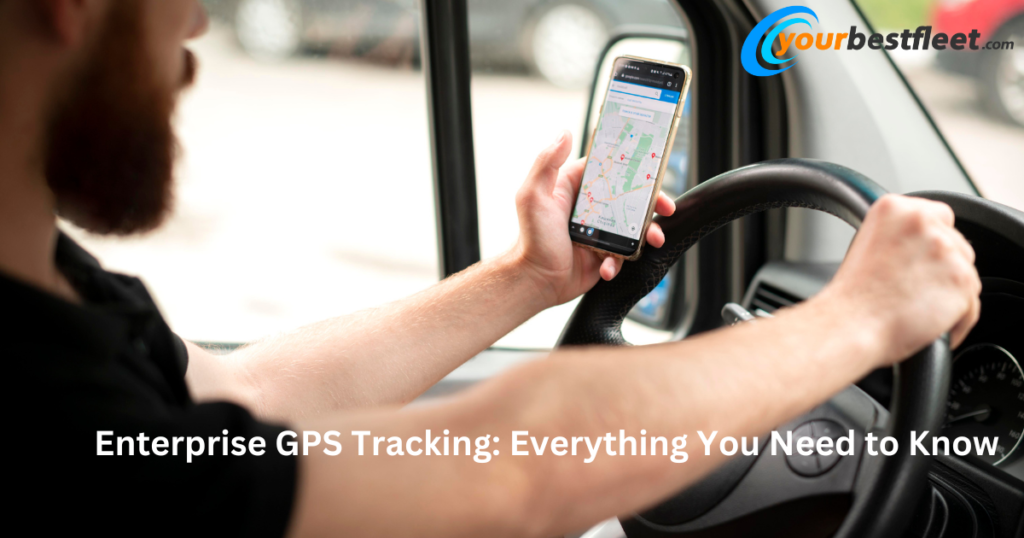Key Takeaways
- Enterprise GPS tracking helps businesses monitor vehicles, employees, and assets efficiently.
- It enhances productivity, reduces costs, and prevents theft.
- Industries like logistics, construction, and healthcare benefit the most.
- Choosing the right system depends on real-time tracking, alerts, and cost considerations.
- Investing in GPS tracking leads to better decision-making, security, and profitability.
How Enterprise GPS Tracking Works? (Step-by-Step Guide)
GPS Device Installation
A GPS tracker is installed in vehicles, assets, or employee devices. These devices come with built-in sensors that collect and transmit data about location, speed, fuel usage, and driving behavior.
Signal Transmission
The GPS device communicates with satellites and cellular networks to send live updates. The system continuously tracks movement and provides real-time coordinates.
Data Processing
The transmitted location data is received by a GPS tracking software. This software processes information such as distance traveled, stop duration, and route history.
Real-Time Monitoring
Business owners and fleet managers can monitor vehicle and asset movement through a dashboard or mobile app. They can track locations, set geofences (virtual boundaries), and receive alerts for unauthorized activities.

Alerts & Reports
The system generates automatic reports and notifications for key activities, including:
Speeding violations
Unplanned stops
Route deviations
Fuel consumption
✔Maintenance reminders
By following this process, companies can improve fleet efficiency, reduce operational costs, and enhance security.
Why is Enterprise GPS Tracking Important? (Key Benefits)
Improved Fleet Management
- GPS tracking helps businesses monitor their fleet operations and optimize routes.
- It prevents unnecessary fuel consumption by suggesting shorter and faster routes.
- Companies can schedule vehicle maintenance based on usage patterns.
Increased Productivity
-
- Helps managers track driver work hours and delivery schedules.
- Reduces idle time by monitoring vehicle stops and movement.
- Ensures employees stay on schedule and complete tasks on time.
Enhanced Security & Theft Prevention
- Businesses receive instant alerts if a vehicle is stolen or used outside business hours.
- Allows remote tracking and vehicle immobilization to prevent unauthorized use.
- Helps in quick recovery of lost or stolen assets.

Cost Savings
- Reduces fuel wastage by monitoring driver behavior (e.g., unnecessary idling, harsh acceleration).
- Prevents excessive vehicle wear and tear through maintenance tracking.
- Lowers insurance costs, as many insurance providers offer discounts for GPS-equipped fleets.
Regulatory Compliance & Safety
-
- Ensures adherence to government regulations on fleet tracking and working hours.
- Provides accurate record-keeping for tax and legal requirements.
- Improves driver safety by monitoring behavior and reducing risky driving practices.
Industries That Benefit from Enterprise GPS Tracking
| Industry | How It’s Used | Main Benefit |
| Logistics & Transportation | Monitors shipments & deliveries | Faster delivery times & route optimization |
| Construction & Heavy Equipment | Tracks machinery & equipment usage | Prevents unauthorized use & theft |
| Public Transport (Buses, Taxis, Rideshare) | Tracks vehicles & schedules | Improves passenger wait times & service |
| Healthcare & Emergency Services | Tracks ambulances & response teams | Faster emergency response |
| Retail & Supply Chain | Monitors inventory movement & supply routes | Reduces lost shipments & improves efficiency |
Types of Enterprise GPS Tracking
Real-Time GPS Tracking
This system provides instant location updates to help businesses monitor assets, employees, and vehicles live. It is useful for companies that require constant oversight of fleet activities.
Passive GPS Tracking
Unlike real-time tracking, passive systems store location data instead of transmitting it live. Businesses can download and review travel history when needed. This is beneficial for cost-saving and compliance tracking.
Fleet Management GPS Tracking
Designed for businesses with multiple vehicles, this system tracks fuel consumption, vehicle health, driver behavior, and route history. It helps companies reduce operational costs and enhance efficiency.
Employee GPS Tracking
Used by businesses to track field employees, such as delivery drivers, sales agents, and technicians. It ensures that workers follow assigned routes and complete tasks on time.
Asset Tracking
Helps businesses secure valuable equipment and shipments. Companies can track assets like trailers, heavy machinery, or high-value goods to prevent loss or theft.
Common Challenges of Enterprise GPS Tracking
Is GPS tracking legal for businesses?
Yes, but businesses must inform employees about tracking and comply with privacy regulations in their region.
Can GPS tracking be hacked?
While GPS systems are secure, companies should use encrypted software and regular security updates to prevent hacking.
Does GPS tracking drain vehicle battery?
No, modern GPS devices are designed to use minimal power and do not significantly impact vehicle battery life.
Can GPS tracking work in remote areas?
Ye but in locations with poor satellite or cellular coverage, tracking accuracy may be lower.
Is GPS tracking expensive?
The cost depends on features, number of vehicles, and tracking type. Many providers offer affordable subscription plans for businesses of all sizes.

How to Choose the Right Enterprise GPS Tracking System? (Checklist)
Identify Business Needs – Do you need tracking for vehicles, employees, or assets?
Check for Real-Time Updates – Live tracking ensures better fleet management.
Look for Mobile Access – A mobile app allows easy monitoring from anywhere.
Ensure Alerts & Reports – Instant notifications improve security and efficiency.
Compare Pricing & Features – Choose a system that fits your budget and needs.
Verify Compliance – Ensure it meets legal and data privacy requirements.
FAQ
Can employees disable GPS tracking on company vehicles?
No, enterprise GPS tracking systems are designed to be tamper-proof and cannot be disabled without administrator access.
How accurate is GPS tracking for fleet management?
GPS tracking is highly accurate, typically within 3 to 10 meters, but can be affected by weather, buildings, and satellite signals.
How long does GPS tracking data stay stored?
Most providers store GPS tracking data for 3 to 12 months, though some offer longer storage options for compliance and reporting.
Can enterprise GPS tracking reduce insurance costs?
Yes, many insurance companies offer discounts for GPS-tracked vehicles as it reduces theft risk, improves safety, and provides incident evidence.
Is GPS tracking useful for small businesses?
Yes, small businesses benefit from GPS tracking by reducing fuel costs, improving efficiency, and preventing unauthorized vehicle use
James Johnson is a former truck driver who now works as a writer, specializing in the trucking industry. With over 15 years of experience on the road, James has a unique perspective on the challenges and opportunities faced by truck drivers and the trucking industry as a whole. His writing focuses on issues such as safety, regulation, and the latest industry trends. His work has been featured in several trucking publications and he has received recognition for his contributions to the industry. In his free time, James still enjoys being around trucks and often attends truck shows and other industry events.


